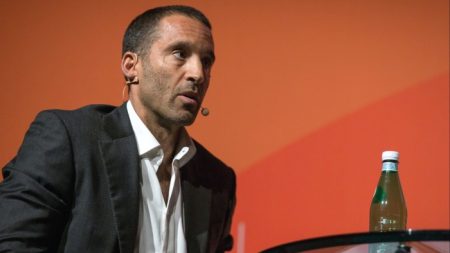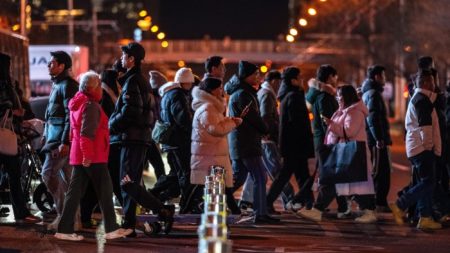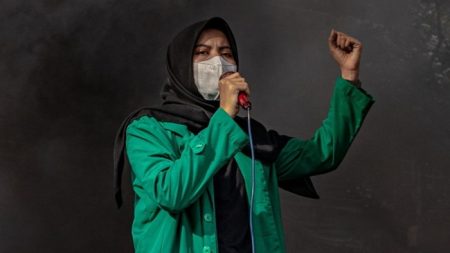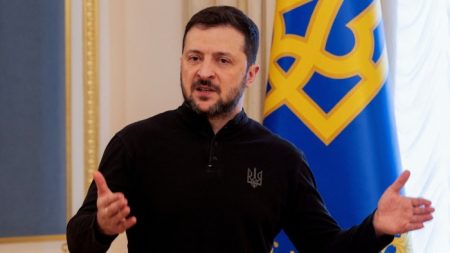The operator of the world’s second-largest container ship fleet will resume sending tankers through the Red Sea after a US-led coalition began providing naval security against attacks by Iran-backed Houthi rebels.
Denmark’s AP Møller-Maersk said on Sunday that it would stop rerouting vessels around southern Africa, a long and costly route, and would proceed through the Suez Canal after the coalition, Operation Prosperity Guardian, was launched.
The multinational operation, unveiled by the US last week, will strengthen a naval task force in the Red Sea to ensure safe passage for commercial vessels through one of the most important global trade arteries, where they have come under drone and missile attacks from the Houthis, a Yemen-based militia group.
The Houthis have launched a string of attacks on ships in recent weeks, which the rebels have said were a response to Israel’s war against Hamas, the Palestinian group that is also backed by Iran, resulting in the biggest reshaping of global trade since Russia’s full-scale invasion of Ukraine last year
“With the Operation Prosperity Guardian initiative in operation, we are preparing to allow for vessels to resume transit through the Red Sea both eastbound and westbound,” Maersk said in a statement on Sunday.
The company added that it was working on plans for the first transits to resume “as soon as operationally possible”, but warned that it could reverse the decision, depending on the risks.
On Saturday, a tanker operating about 200 nautical miles from the coast of India was attacked by a drone, the first incident targeting a vessel far beyond the Red Sea. According to the Pentagon, the drone originated from Iran, also a first since the start of the spate of Houthi attacks.

In Gaza, Palestinian officials tallied at least 106 people killed by Israeli shelling on Sunday night, making Christmas Eve one of the deadliest nights since the start of Israel’s land and air offensive against Hamas.
Most of the victims were killed in a single Israeli airstrike on the Maghazi refugee camp, the Palestinian health ministry said. The Palestinian health ministry accused Israel of targeting roads in central Gaza, which had previously largely been spared, impeding ambulances. A spokesperson described the scene at Maghazi as a “massacre”.
The ministry raised its death toll in Gaza to more than 20,400 since the start of the war on October 7, when Hamas militants infiltrated southern Israel, killing 1,200 people, according to Israeli authorities. Israel has responded with a bombardment and invasion of the enclave that it says is intended to eradicate the militant group.
The Israel Defense Forces said on Monday that its fighter jets also attacked Khan Younis in southern Gaza, killing a Hamas commander.
On Christmas Eve in Bethlehem in the occupied West Bank, seasonal festivities were called off out of respect for the losses in Gaza, though celebrants gathered at the Nativity Church for a muted, candle-lit mass and read prayers for peace.
In Rome, Pope Francis decried the violence. “Tonight, our hearts are in Bethlehem, where the Prince of Peace is once more rejected by the futile logic of war, by the clash of arms that even today prevents him from finding room in the world,” he said.
Israeli forces suffered high losses over the weekend, with 15 soldiers killed in two days, the military said on Sunday, and two further deaths on Monday, bringing the total to 156 soldiers killed since the start of the war.
Despite the mounting casualties, Prime Minister Benjamin Netanyahu vowed in a Christmas message to press on until Israel prevails, saying the country was fighting against “monsters” in “a battle of civilisation against barbarism”.
“Christmas is supposed to be a time of goodwill to all men and peace on Earth. Well, we don’t have peace on Earth, not in our part anyway,” Netanyahu said, adding: “We shall win this war and secure our common values.”
Despite 11 weeks of fighting, Israel has not managed to achieve its objectives of “destroying” Hamas as a military and governing force in Gaza and securing the return of more than 100 remaining Israeli hostages.
Egypt, which alongside Qatar is attempting to broker a truce between Israel and Hamas, has drafted a proposal for a ceasefire and hostage deal, Israeli media reported on Sunday. The plan would see fighting halt for a fortnight and the release of 40 women, children and elderly people held hostage by Hamas in exchange for 120 Palestinians in Israeli prisons.
In the second phase of the deal, Egypt would co-ordinate talks between Palestinian factions to create a single government over Gaza and the West Bank, a total ceasefire and the completion of the hostage exchange.
Amid growing criticism in Israel of the lack of clear military success and the growing death toll among its soldiers, Israel’s president Isaac Herzog called for unity.
Israel’s enemies “celebrate when they see the cracks between us”, Herzog warned, urging politicians to exercise restraint in airing grievances. “I appeal directly to the leaders of the people . . at this time there is one imperative: and that is for unity.”
Over the weekend, thousands protested in Tel Aviv against the government and called for elections. The crowd was addressed by relatives of civilians killed on October 7 by Hamas, and by a soldier who pledged to sue the government for its failures.
Read the full article here















